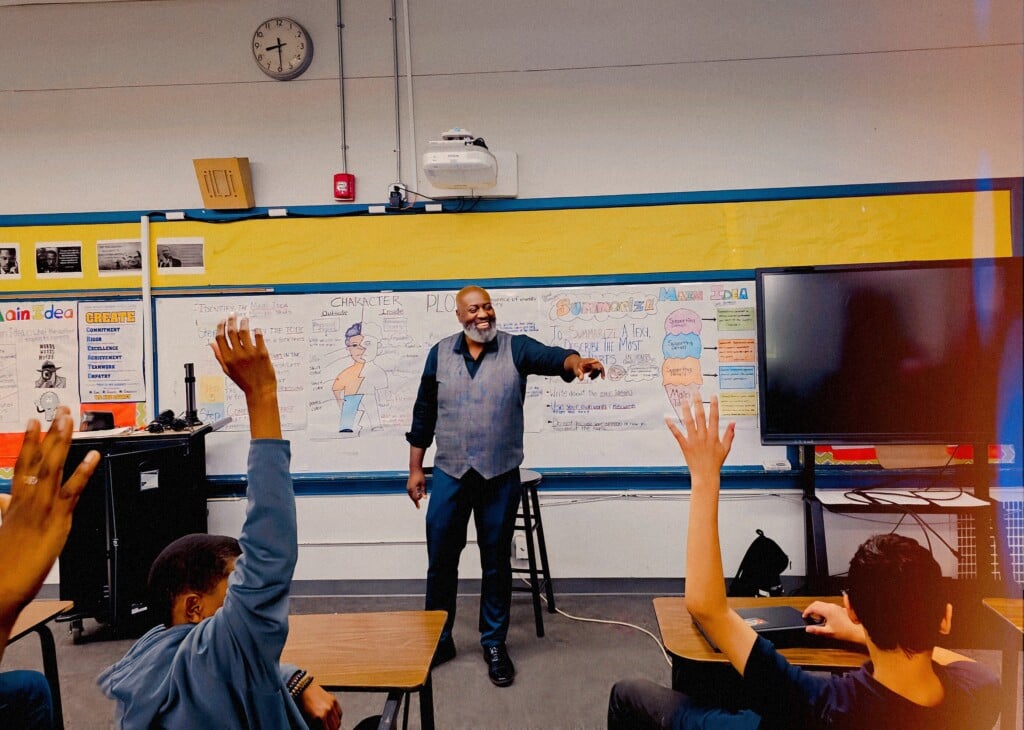Top Primary Science Tuition Singapore to Help Your Child Excel
Top Primary Science Tuition Singapore to Help Your Child Excel
Blog Article
Discover the Essential Advantages of Understanding Main Scientific Research for Young Learners
The relevance of main science education and learning for young students expands far past mere expertise acquisition; it works as a basic pillar in developing essential skills such as vital reasoning, problem-solving, and imagination. Involving with clinical principles through interactive and inquiry-based tasks not just grows curiosity but also lays the groundwork for durable, positive students. As we check out these advantages better, it comes to be clear that the implications for future academic and personal development are extensive. Nonetheless, what details strategies can teachers utilize to make best use of these advantages?
Enhancing Important Believing Skills
Fostering essential believing skills in young students is necessary for their cognitive development and future scholastic success. Important thinking makes it possible for kids to evaluate details, examine evidence, and make notified decisions, which are essential abilities in today's information-rich society. By involving in scientific questions, young learners can enhance these skills as they discover concepts via reasoning, observation, and trial and error.
In primary science education and learning, teachers can promote important thinking by urging trainees to ask inquiries, develop theories, and conduct experiments. This hands-on strategy allows kids to exercise problem-solving and establish sensible reasoning skills. When pupils explore the residential or commercial properties of materials or the principles of motion, they learn to evaluate their findings critically and attract verdicts based on proof.
Furthermore, conversations and collective jobs can promote crucial thinking by providing opportunities for students to express their ideas, difficulty assumptions, and consider varied point of views. By producing a helpful environment that values inquiry and representation, teachers can nurture crucial thinking abilities that equip young learners to come to be long-lasting learners and independent thinkers. Eventually, enhancing these abilities lays a robust foundation for their future scholastic ventures and individual development.
Fostering Inquisitiveness and Expedition

Key science education and learning supplies a structured atmosphere where young students can check out numerous phenomena via hands-on experiments and observations. By enabling them to interact with materials and participate in inquiry-based knowing, instructors create chances for youngsters to develop theories, test their ideas, and reason. Such experiences nurture a feeling of marvel and excitement regarding scientific research.

Building Confidence in Problem Solving
Building self-confidence in analytic is a crucial component of primary scientific research education and learning that encourages young learners to approach challenges with resilience and creative thinking - primary science tuition Singapore. When youngsters are urged to involve with scientific concepts via hands-on tasks and inquiry-based discovering, they establish vital skills in crucial reasoning and evaluation. This procedure not only enhances their understanding of clinical principles but additionally promotes a sense of possession over their discovering
To develop confidence, instructors must develop an encouraging setting where blunders are deemed opportunities for development instead of failures. This urges trainees to take threats and check out various options to problems. By giving scaffolding and support, educators can assist pupils navigate intricate tasks, slowly raising their self-reliance in analytic situations.
Moreover, collaborative knowing experiences, such as group jobs or experiments, can additionally improve trainees' confidence as they learn to articulate their thoughts and listen to others' viewpoints. These communications support social abilities and strengthen the idea that analytical is typically a collective venture. Ultimately, cultivating self-confidence in analytic prepares young students for future scholastic difficulties and furnishes them with the tools necessary for long-lasting understanding.
Urging Creative Thinking and Technology
In the world of main science education and learning, motivating imagination and development is important for cultivating a vibrant discovering atmosphere. By fostering a society where young learners can explore concepts and experiment easily, educators aid students create essential believing abilities and an enthusiasm for discovery. Creative thinking in science urges kids to ask inquiries, create hypotheses, and take part in hands-on activities that promote their imagination.
Incorporating open-ended jobs and inquiry-based learning into the educational program allows pupils to express their special go now perspectives and options. When tasked with fixing a trouble related to their environment, trainees can conceptualize numerous methods, leading to innovative end results that display their creativity. This not only deepens their understanding of scientific ideas yet also infuses a sense of possession over their learning procedure.
Furthermore, creative scientific research education supports cooperation amongst peers, as students frequently share ideas and improve each other's understandings - primary science tuition Singapore. This joint spirit advertises not just technology yet additionally essential social abilities. Thus, by prioritizing imagination and development in main science education, we empower young students to assume seriously, accept difficulties, and visualize possibilities, laying a strong structure for long-lasting discovering and expedition
Getting Ready For Future Knowing Challenges
Young students' capacity to navigate future knowing challenges rests on a strong foundation in primary scientific research education. This foundational understanding equips pupils with crucial assuming skills and a systematic approach to analytic, vital for tackling intricate problems in an ever-evolving world. Key science cultivates inquiry-based discovering, encouraging trainees to ask questions, discover hypotheses, and take part in hands-on experiments.
As they establish these abilities, learners come to be proficient at analyzing data, identifying patterns, and drawing educated final thoughts. click to read more Such expertises are important not just in scientific fields yet likewise in engineering, innovation, and math (STEM), where interdisciplinary knowledge is progressively critical.
Furthermore, key science education cultivates a feeling of inquisitiveness and resilience in young learners, allowing them to watch challenges as chances for growth. As they come across and get over obstacles in their scientific explorations, they develop confidence in their capability to adjust and introduce.
Ultimately, a strong foundation in primary science not only prepares young learners for academic quests however likewise furnishes them with the devices needed for long-lasting understanding and flexibility in a swiftly changing global landscape. By investing in primary science education, we are buying the future potential of our learners.
Final Thought
Recognizing main scientific research is important for young learners, as it promotes crucial reasoning, curiosity, and creative thinking. Ultimately, the advantages of primary scientific research education prepare kids for future academic quests and instill long-lasting learning routines essential for growing in an ever-evolving globe.
The significance of key science education and learning for young learners prolongs far past plain understanding acquisition; it offers as an essential column in creating vital skills such as important reasoning, analytical, and creative thinking. By creating a helpful setting that values inquiry and reflection, instructors can support essential thinking skills that equip young students to become independent thinkers and lifelong learners. Therefore, by focusing on creative thinking and advancement in key science education, we equip young learners to believe critically, accept difficulties, and imagine opportunities, laying a strong foundation for lifelong knowing and exploration.
Young learners' ability to navigate future learning obstacles pivots on a strong structure in key scientific research education and learning.Understanding key scientific research is crucial find out for young learners, as it cultivates crucial thinking, interest, and imagination.
Report this page